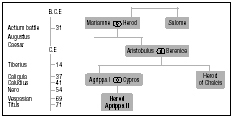Agrippa II
(28 - 92 C.E.)
AGRIPPA II (Marcus Julius or Herod Agrippa II; 28–92 C.E.), last king of the Herodian line; son of Agrippa I. Like his father he was educated in Rome and he was there when he learnt of his father's death. The emperor Claudius refused to let him succeed on account of his youth. His uncle,
*Herod
II of Chalcis, died in the year 48 and Agrippa received this small kingdom two years later. Agrippa's coins indicate that he reckoned his reign from the year 50. During his reign he was accorded the title "king" although at no time was he king of Judea as his father had been. Claudius entrusted to him the supervision of the Temple in Jerusalem and gave him the right to appoint the high priest. In 54 his rule over Chalcis was brought to an end; he was compensated with the tetrarchy of Lysanias which consisted of Bashan-Trachonitis and Gaulanitis and with the administration of the province of Varus. From then on he was one of the most important rulers in the eastern part of the Roman Empire. During Nero's reign his borders were extended once again. In 61 he received parts of Galilee including Tiberias and two towns in Transjordan. The dates of these

events are recorded on the king's coins, which, in his non-Jewish territories, bore his likeness. At the Jewish revolt against Rome in 66, Agrippa was in Alexandria. He hurried back to Jerusalem to try to convince the people of their helplessness against the power of Rome. His mission failed and he supported Rome in the war that ensued. He fought in Vespasian's campaign and was slightly wounded in an engagement near Gamala. In 68, on receiving the news of Nero's death, he set sail with Titus for Rome. On the way they heard of the murder of the new emperor Galba. Titus immediately returned to his father while Agrippa journeyed on to Rome. When Vespasian was proclaimed emperor, he sent word to Agrippa, who left Rome furtively and offered his services to the new emperor. Vespasian granted him new estates which appear to have been in the north. Agrippa's kingdom was populated mostly by non-Jews, but his attitude toward Judaism was different from that of his forefathers. At least while he was in Judea he showed a superficial respect for Jewish religious practices; some scholars even claim that he was the Agrippa whose attachment to Judaism was praised by the rabbis. According to the New Testament he showed an indifferent attitude toward the spread of Christianity (Acts 25–26). His promotion of Hellenistic culture is attested by a number of inscriptions. There were rumors that Agrippa had incestuous relations with his sister
*Berenice
(cf. Juvenal, Satires, 6:156), but this may have been merely Roman gossip based on the fact that Berenice lived for some years in her brother's house.
BIBLIOGRAPHY:
Schuerer, Gesch, 1 (19044); A.H.M. Jones, The Herods of Judaea (1938), 217–22, 231–5, 237–42, 249–59, passim.
Source: Encyclopaedia
Judaica. © 2008 The Gale Group.
All Rights Reserved.
|